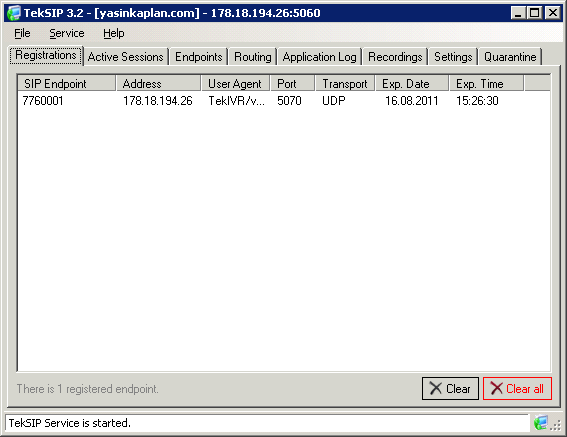TekSIP is a SIP Registrar and Stateless SIP Proxy for Windows. It supports UDP, TCP and TLS transports. TLS is supported in only commercial editions. TekSIP is tested on Microsoft Windows XP, Vista, Windows 7 and Windows 2003-2008 server. TekSIP complies with RFC 3261, RFC 3263, RFC 3311, RFC 3581 and RFC 3891.
It supports NAT traversal, UPnP and ENUM. You can select IP address to be listened and alternative SIP endpoints for outgoing calls. You can also log session details into a log file and monitor active registrations and sessions in real-time. You can monitor number of active registrations and sessions using Windows Performance Monitor (Perfmon.exe).
Features
- TekSIP can redirect calls to alternate endpoint when called endpoint is unavailable (Off-line, busy). Active SIP session can be terminated via GUI. TekSIP has a Presence Server (SIP/SIMPLE based).
- TekSIP also supports UPnP IGD specification. If installed behind UPnP supported Internet gateway device (ADSL router e.g.), TekSIP automatically detects if it is behind a new NAT gateway and the external IP address. All outgoing requests manipulated for NAT traversal. You do not need to add manual reverse mappings for SIP and RTP protocols.
- [advt]TekSIP can optionally act as a B2BUA for incoming 3xx SIP responses. TekSIP can also act as a RTP Proxy and record audio streams if RTP proxy enabled. Recorded audio streams are saved in wave format can be played using TekSIP Manager. RADIUS Authentication (RFC 2865) and Accounting (RFC 2866) is supported.
- TekSIP monitors failed registration and call attempts from suspicious endpoints and blacklists them. You can monitor black listed endpoints through TekSIP Manager and you can remove black listed endpoints from quarantine list if required. You can also ban specific user agents.
- TekSIP also provides single accounts proxy; if you have just one provider account and many internal clients, TekSIP proxies all external calls for the provider account. TekSIP can register to upstream SIP servers to receive incoming calls.



Be the first to comment